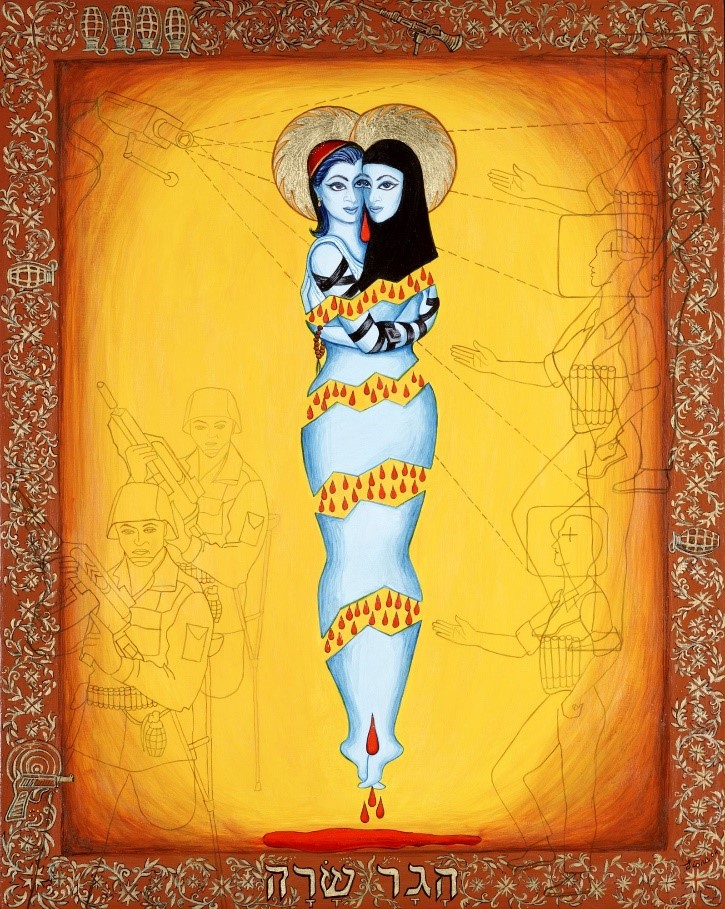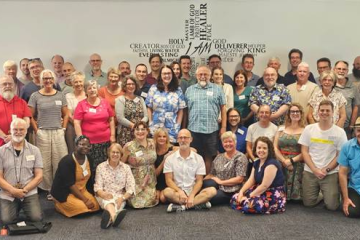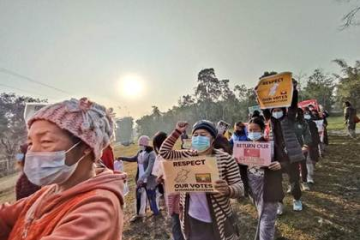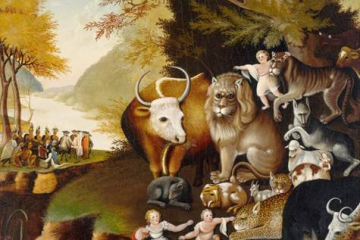A song I have running around and around in my head at the moment is ‘Peace, Salaam, Shalom’ by Pat Humphries and Sandy Opatow of Emma’s Revolution. (You can read the origin story of the song here – https://www.youtube.com/watch?v=FETbuMdnthI)

But thinking about that song, and especially about the story of Hagar and Sarah that we heard last Sunday, I came across this artwork by Siona Benjamin and the poem (below) by Mohja Kahf.
“Kin” by Mohja Kahf
Sarah, you massaged my sacrum
with a tennis ball when I was in labor.
Like a priestess of the body, you
wiped the newborn Ismail clean
of birthblood and whispered first
holy words into his ear. You are his mother
too. We are kin. No decrees
of man or God can make this truer
than it is, nor can it be cloven.
We did not begin with the husband we shared,
but in Egypt, with divine
intelligence arrowed from eye to eye
across a patio of pagan strangers,
when I was royalty and you were trembling
in the house. You knew exile and I
knew exile. You suffered and I suffered.
Like matter, kinship can be changed
but not destroyed. Cruelty tarnishes,
but cannot dissolve it. We are kin
from bread baked together,
salted, broken, eaten, sacred
as a challah braid at sunset on the Night of Power;
from the battering waters of the sea we crossed;
from the Tree of Life whose branches
we burned to stay alive. Kin
we are from knowledge of the Name;
you had the first letters, I had the last
and, putting them together, we
spelled out the Secret.
Mohja Kahf is a Syrian American poet, novelist, and scholar of Arabic literature, postcolonial studies, and Arab and Arab American feminism. Her second book of poetry is called Hagar Poems where she gives voice to several characters in Islamic and biblical history, including Hagar and Sarah.
Several of these poems use the relationship between Hagar and Sarah as a metaphor for the relationship between the modern-day nation of Israel and the Islamic world. These poems explore some of the ideas Paul Flavel from Hagar Australia expressed on Sunday – how experiences of oppression can be replicated – once a group are no longer oppressed – in how they treat others. This poem, however, is more positive – imagining a more compassionate sisterhood between the two matriarchs.
In the same way, Indian American Jewish artist, Siona Benjamin, also looks at religious characters, particularly the biblical matriarchs, as metaphors for contemporary challenges and conflicts.
In her painting (above) Beloved (Sarah and Hagar), 2004, Sarah wears a kippah on her head and tefillin (small boxes with passages from the Torah curled inside) on her arms, while Hagar wears a hijab and a misbaḥah (string of prayer beads). The two women are wound together in a tight embrace. They are also wounded together. On the left side of their bodies are amputee Israeli soldiers and a surveillance camera. On the right side are the Palestinian suicide bombers it has identified. But Benjamin, too, sees this painting as a sign of hope – of the eventual reuniting, despite their shared wounds, of Sarah and Hagar.
As followers of the Prince of Peace, of the one who came to make peace among us, we believe in peace. We like Mohja Kahf and Siona Benjamin will create peace. We will pray for peace. We will work for peace to the best of our abilities. And we support organisations like Hagar bringing peace to the lives of people who have been oppressed – like the young woman Paul told us about on Sunday – now free of her sexual servitude and able to work to support her mother and sisters.
Grace and peace, salaam, shalom…
Belinda


